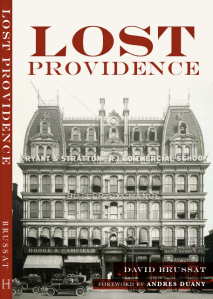
Here’s the column I described in my post earlier today, “Surrounded by beauty,” about attending the Bruneau & Co. auction showroom, in Cranston.
***
January 26, 1989
Supply versus demand at its worst: Two book lovers chasing one book
All hail the hurly-burly of the marketplace, but for me a small, safe desk in the far corner of the office will do fine. For all the thousands of words I’ve written hawking the wonders of capitalism and urging other people to go out there and compete, I rather shrink from it myself. I suppose I have the soul of a bureaucrat.
I hasten to add that I’m proud to have the soul of a bureaucrat, as I’m the son of one, a bureaucrats’ bureaucrat in fact, who worked at that temple of bureaucracy, the Office of Management and Budget. Dad was on “the management side,” so he devoted many years to improving the management of the bureaucracy.
Among his non-bureaucratic aspirations was to run an establishment where one could both buy a book and booze it up – not the book but oneself. He envisioned his customers reaching that modestly inebriated state of mind which H.L. Mencken described as “sweetly stewed,” while either reading quietly or talking of books with other patrons.
Perhaps because my father gauged the peril such an establishment would face in competition with stores catering exclusively to readers or drinkers, this goal eluded him.
Nevertheless, he got a lot of reading done at home. I imagine he’d smile at the extent to which he passed his bookishness on to his three sons, and I suppose he would nod at my reluctance to charge into the competitive fray. I felt this disinclination anew last week at an auction of books.
I attended the auction and bid on a book, neither of which I had ever done before. The experience embodied, for me, the principle of supply and demand at its most confrontational: too many buyers chasing too few goods; in this case, two chasing one. The auction itself was fascinating, but bidding against one other person for what we both badly desired was singularly unpleasant.
My quarry was listed in the auction catalogue as Lot 124: “The Plain Speaker, L(ondon), 1826, 2 vol set. Paper on boards, Gd (25-75).” The name of the author was not disclosed in the catalogue, probably because, as was often the case in those days, it was not disclosed in the book. However, I knew that it was by my favorite author, William Hazlitt, who had had a collection of essays published that year under the same title. In short, it was a first edition, but that was not mentioned in the catalogue either. It was expected to fetch somewhere between $25 and $75. Was I the only one at the auction who knew its true value?
Hazlitt is best known for his Shakespearean criticism, but I prefer his personal essays, and his best are in The Plain Speaker. In 1978, I left a beautiful edition of it (though not a first) behind in a Washington bar after celebrating the publication of my first letter to the editor, and I had not replaced it since then with any edition of comparable value.
As I arrived at Knights of Columbus Hall in Middletown last Thursday afternoon, I suspected I might now be able to do so, and on the cheap to boot.
Some 30 people, mostly men, all but three of whom wore spectacles, were in attendance as the bidding began. Bookish as I am, I felt out of place – not for lack of glasses but for lack of a sweater and a plaid shirt. Having left the office early to attend, I was the only bidder in suit and tie. Thankfully the auctioneer, Jim Weyant of The Scribe’s Perch in Newport, wore a top hat, which balanced things out a bit.
It took an hour and a half to auction off the first 123 lots. When the Hazlitt finally reached the block, I was ready. There were no absentee bids, so the bidding started at $5. I raised my hand, and waited in the silence that followed for Jim to conclude that nobody else was interested in a somewhat tattered set of old books with no apparent author.
But instead of letting his hammer fall to announce my sly victory, his eyes darted to the back of the hall, his hand pointed, and to my distress he said, “Ten dollars . . . Do we have $15?” I raised my hand again, fearing to glance back to discover my adversary, who bid $20, whereupon I bid $25, he bid $30, I $35, and on and on until the bidding reached $110, well beyond what I imagined myself paying. I stopped raising my hand at that point, but he didn’t. The hammer fell at $120, and I lost the Hazlitt to this villain, who seemed to have bottomless pockets.
During the bidding, a sort of vertigo overtook me as I wondered how high it would go, how much I really was willing to pay for the book, the mortification I might feel if I were to drop out of this wallet-to-wallet combat first. The fear of bankruptcy triumphed over the fear of humiliation in the end, though when it was over even this failed to occur beyond a vague but bearable embarrassment at losing.
Afterward, I mustered the gumption to introduce myself to my antagonist, who, it turned out, is a used-book dealer, Michael Chandley of Cellar Stories in downtown Providence. He said he was bankrolled by somebody behind the scenes who recognized that Lot 124 was a first-edition Hazlitt: a professor at Brown University whose name he wouldn’t reveal. Whomever he or she may be, I suspect (because he avoided the auction and because he is a professor) that the actual practice of free-market principles attracts him no more than it does me.
Does my squeamishness render me an unworthy proponent of capitalism? I should hope not! Fortunately, capitalism in recent years has argued its case well enough on its own – so well, in fact, that the Marxists of Moscow and Beijing are trying it out. To say the least, the bureaucrat in me is glad to have so much help.
David Brussat is a Journal-Bulletin editorial writer.
Copyright © 1989. LMG Rhode Island Holdings, Inc. All Rights Reserved.
Record Number: MERLIN_1590416



Thank for share…
LikeLike
Pingback: Surrounded by beauty | Architecture Here and There